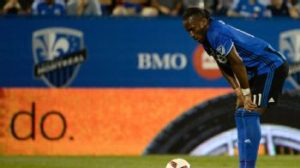Drogba refused to play on Sunday’s match
Montreal Impact on Sunday’s match 2-2 tie against Toronto FC.
Impact knew before signing Drogba in July 2015 that would be almost 39 when his 18-month pact concluded.
Impact knew about Drogba’s challenge would fade in his second season with the club was always a distinct possibility. And from the start, they never treated Drogba the same as everybody else, well that was obvious.
After Saputo demanded that the Ivorian honor the final year of his contract following an invitation to return to Chelsea in a coaching role “l’affair Drogba 1.0 — the Impact let their talisman join preseason camp late so he could work with his own trainer in Qatar. They’ve allowed him and his creaky knee to skip games played on artificial turf. They can’t pretend now that he’s just another player.
He can be a diva, no doubt about it. Nobody who witnessed him hiding in a locker last season rather than speak to the media will dispute it.
But it’s also not hard to understand how a player of Drogba’s stature might feel embarrassed by being passed over for a hugely important match. These are almost certainly the final few games of Drogba’s long and brilliant career, and it’s safe to say the Premier League and European champion didn’t come to Canada to ride the bench.
“When you have a guy like Didier, a lot of the attention is on that person,” Impact captain Patrice Bernier said Tuesday. “Sometimes people forget that decisions do stir emotions. They kind of forget that professional athletes are human beings.”
For the most part, the Impact have gotten what they wanted from Drogba. He put the club on the map not just internationally, but inside MLS. He scored a bunch of goals, including 11 in his first 11 games last season. He has been an invaluable influence on young players like emerging Canadian striker Anthony Jackson-Hamel. That the teammates he deserted are willing, to a man, to welcome him back with open arms speaks to his popularity in the locker room.
“Everybody respects him tremendously, and not just because of the status of the player,” Bernier said to ESPN.
But status still matters more in MLS than it does in most places. It’s by design. And as long as it’s the case, teams must be willing to live and die with their superstars.



